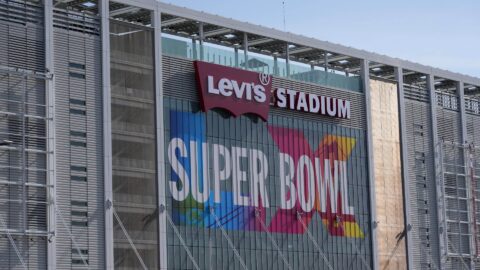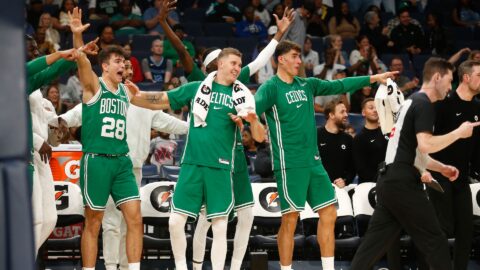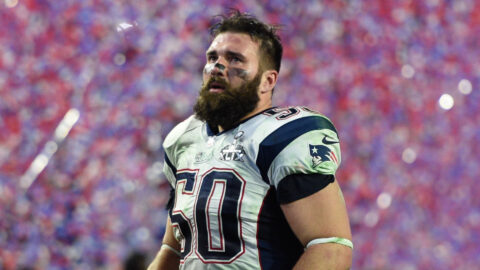What does having an MVP quarterback get you? For the Saints and Packers, not much.
That's the case after the Saints and Packers were both stunned over the weekend with losses to the 49ers and Giants, respectively.
The season for either Drew Brees or Aaron Rodgers, though, isn't yet over, as one of the two quarterbacks will almost assuredly be named league MVP during Super Bowl week. It will be a tremendous honor for whichever player receives the award, but it will no doubt be a bittersweet consolation to football's ultimate prize.
In any other year, Tom Brady, a man who's still alive in the hunt for a Super Bowl title, would also be in the thick of the race for the MVP award. His 5,235 passing yards are the second-most in a season… ever. His 39 touchdown passes are the second-most he's had in a season during his Hall of Fame career, with the only better mark being the NFL record 50 he threw in 2007. He was in almost every way, shape and form a prototypical MVP.
But not this year. Not when Brees completed an absurd 71.2 percent of his equally as absurd 657 pass attempts for 5,476 yards (most all time) and 46 touchdowns. Not when Rodgers nearly led his Packers to an undefeated season by completing 68.3 percent of his passes for 4,643 yards, 45 touchdowns and just six interceptions. By comparison, Brady threw 12 picks while Brees had 14.
While just one of these men — presumably — will be awarded this year's MVP, the other two are certainly deserving. In fact, that argument is reinforced when taking a look back at the co-MVP of 2003.
That year, 16 voters selected Peyton Manning as the MVP, and 16 voters selected Steve McNair, thus leading to the two players sharing co-MVP honors.
That year, Manning threw for 4,267 yards, 29 touchdowns and 10 interceptions. McNair threw for just 3,215 yards, 24 touchdowns and seven interceptions, while adding four touchdowns on the ground.
Obviously, the league has changed quite a bit in the past year or two, allowing quarterbacks to attack defenses with more freedom than ever before, so you can't compare the '03 numbers with the '11 numbers and take them at face value.
However, if you look at how Brees, Rodgers and Brady peformed relative to their peers in '11 with how McNair and Manning stacked up in '03, the comparison shows this year's trio was far superior.
| Player/Season | Completion percentage | Yards | Touchdowns | Interceptions | Passer rating |
|---|---|---|---|---|---|
| Manning, '03 | 67.0, 1st | 4,267, 1st | 29, 2nd | 10, 7th-fewest | 99.0, 2nd |
| McNair, '03 | 62.5, 9th | 3,215, 15th | 24, t-7th | 7, 2nd-fewest | 100.4, 1st |
| Brees, '11 | 71.2, 1st | 5,476, 1st | 46, 1st | 14, 20th-fewest | 110.6, 2nd |
| Rodgers, '11 | 68.3, 2nd | 4,643, 4th | 45, 2nd | 6, 2nd-fewest | 122.5, 1st |
| Brady, '11 | 65.6, 4th | 5,235, 2nd | 39, 4th | 12, 14th-fewest | 105.6, 3rd |
So the only measure that said McNair and Manning were the two best quarterbacks was passer rating, a stat considered to be a decent barometer but incredibly flawed.
In fairness, McNair only played 14 games, thereby limiting his production, but Rodgers only played 15 games this season as well, and he was still near the top of every category.
Ultimately, this year's award will go to either Brees or Rodgers. If voters could vote for a co-MVP or even a three-way tie, they might, but they can't. Regardless of the outcome, any of the three players would have been a unanimous selection in almost any other season.
You had Rodgers setting an all-time record in passer rating, Brees breaking his own all-time record in completion percentage, Brees and Brady breaking Dan Marino's longstanding yardage record and a combined 41-7 record. You could make the case that one deserves the award over another, but you can't say that nobody in the group isn't an MVP.
Oh, and that 2003 season? Brady beat both McNair and Manning in the playoffs on his way to winning a much more important trophy, the one that bears Vince Lombardi's name. Chances are he's a little more focused on that than he is the MVP.



